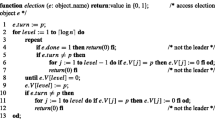Summary.
Consensus is one of the most fundamental problems in the context of fault-tolerant distributed computing. The problem consists, given a set Ω of processes having each an initial value v i , in deciding among Ω on a common value v. In 1985, Fischer, Lynch and Paterson proved that the consensus problem is not solvable in an asynchronous system subject to a single process crash. In 1991, Chandra and Toueg showed that, by augmenting the asynchronous system model with a well defined unreliable failure detector, consensus becomes solvable. They also give an algorithm that solves consensus using the ◊? failure detector. In this paper we propose a new consensus algorithm, also using the ◊? failure detector, that is more efficient than the Chandra-Toueg consensus algorithm. We measure efficiency by introducing the notion of latency degree, which defines the minimal number of communication steps needed to solve consensus. The Chandra-Toueg algorithm has a latency degree of 3 (it requires at least three communication steps), whereas our early consensus algorithm requires only two communication steps (latency degree of 2). We believe that this is an interesting result, which adds to our current understanding of the cost of consensus algorithms based on ◊?.
Similar content being viewed by others
Author information
Authors and Affiliations
Additional information
Received: April 1995 / Accepted: October 1996
Rights and permissions
About this article
Cite this article
Schiper, A. Early consensus in an asynchronous system with a weak failure detector. Distrib Comput 10, 149–157 (1997). https://doi.org/10.1007/s004460050032
Issue Date:
DOI: https://doi.org/10.1007/s004460050032




